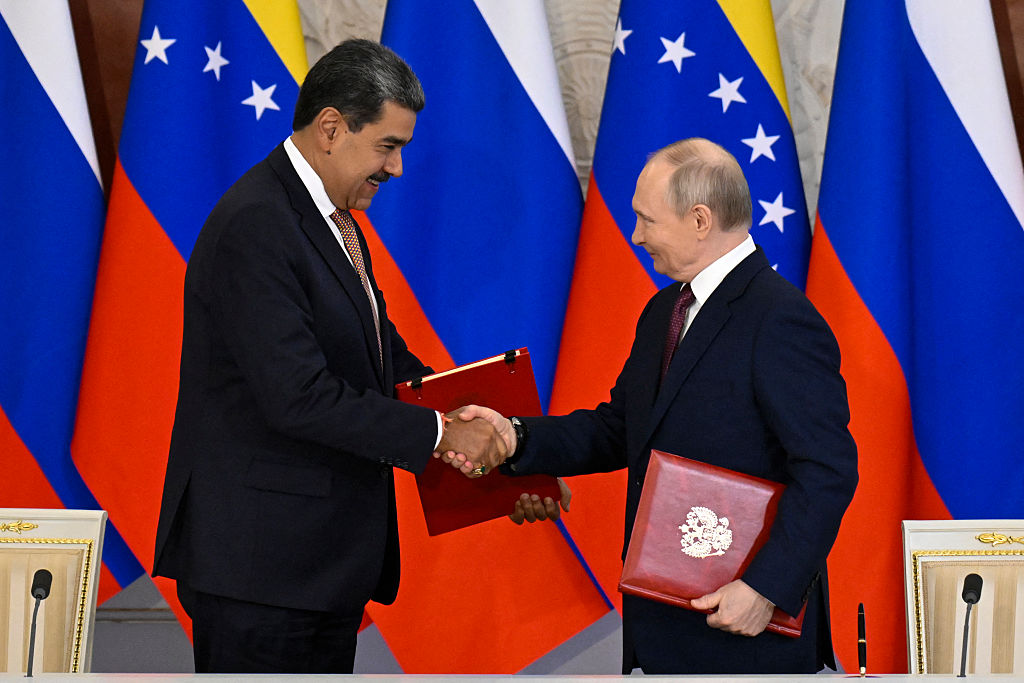The United Kingdom’s incoming Labour government has pledged a more robust Iran policy than the Conservative Party has had over the last decade. The bar is low. Somehow, nothing new came of Iran’s women’s movement, support for Russia, assassination attempts on British soil, and attacks on all our regional partners — or the unprecedented cross-party consensus this all generated.
Tehran may never have a better window for building a bomb
Labour is apparently planning a pivot that includes proscribing the Islamic Revolutionary Guard Corps (IRGC), cracking down on Iran’s domestic networks, and more robust deployments to the Middle East and Mediterranean. Whether Keir Starmer’s party will implement these plans is another question. The key difference is that US-Iran policy, so long the anchor of Britain’s, is now adrift. Those charting Labour’s new course would do well to ask why, especially as Iran elects a new president this Friday.
Since the Obama years, Democrats have viewed Iran through the prism of what might be called “Malleyism” after Robert Malley, who, until last June, served as Biden’s Iran envoy. Malley went to school in Paris with the Secretary of State Antony Blinken, did a doctorate on third-worldism at Oxford, and served in the Clinton and Obama administrations as a mediator. He was suspended last year, allegedly for inappropriately handling classified information. But far more interesting than Malley — who denies any wrongdoing — is the concept he evangelized, and why it failed so badly.
For more than ten years, Malleyism has been anchored in two assumptions. First is a belief that reformist elements could come to power in Tehran to chart a genuinely moderate course. Second is a belief that Iran’s relations with the West can be improved without trading off fundamental strategic interests. A single misunderstanding about the nature of the Iranian state ruins these assumptions, and the hint is in the name: the Supreme Leader is the only real power in Iran.
The Islamic Republic is an absolute dictatorship. Functionaries must fawn for his attention and patronage because he has the final say. The IRGC, created as a praetorian guard, dominates the Iranian economy, foreign policy, and political life. Why? Because they swear loyalty to the leader, not the country. Empowering “reformists” means giving insiders opportunities to please the supreme leader. This inevitably involves strengthening the regime and undermining possible agents of actual change.
Reformists are a steam valve. They release pressure from inside and reduce pressure from outside. But with a tendency to nationalism and technocracy, they are fundamentally at odds with the supranational, theological vision of the supreme leader. By design, they can never install one. They face relentless pressure from Iran’s clerical and military “deep state.” Ideologues who despise their pragmatism will always be closer to the leader because they share his worldview. Malleyism ignores this. Blurry memories of the nineties are partly to blame.
Many Iran doves, including Malley himself, cut their teeth during the presidency of the reformist Mohammad Khatami. They lament what could have been, often claiming that Khatami offered rapprochement with the West and the Iraq War spoiled the chance. Not only was the deal probably fake. We know now that, while they ate finger sandwiches at Track Two dialogues, Iran’s real rulers were building a nuclear weapons program and systematically killing off reformists. The reification of the Khatami years, along with a distorted view of the Iranian state, are Malleyism’s founding myths.
Might Trump and Starmer relive the surprising partnership of Richard Nixon and Harold Wilson?
Malley also broke a key Cold War rule by depending on émigrés with vested political interests in their homeland. Last September, Semafor leaked correspondence between “experts” working with the White House and top Iranian officials, peppered with deferent and bizarrely obsequious language. Did Malley accidentally enable an Iranian influence network? Maybe. The real problem is that he was surrounded by people who saw aiding Iranian reformists as the ends of US policy. This perforce meant identifying American interests, to some extent, with those of the regime.
The road to hell was paved with good intentions. In 2021, Malley declared that “the window of diplomacy is never going to be closed.” Even now, there is still no discernible red line that Iran could cross which could end diplomatic outreach. Iran can undermine Western interests, returning to the negotiating table at its leisure. Sanctions enforcement remains lax. Why? Because sanctions “generate paranoia” within the regime (thus undermining reformists). But nothing would be different if, next Friday, a reformist president is elected in Iran. If anything, a reformist could provide a convenient excuse for more Malleyism, defusing a growing Western consensus on just how dangerous Tehran is. It could even, as Khatami did, serve as a smiling cover for finally building a nuclear bomb: Tehran may never have a better window.
The Middle East is ground zero for the failures of “responsible statecraft.” Malleyism failed because it assumed that reformists could matter in a one-man theocratic dictatorship. It failed by forgetting that, for the Islamic Republic, success in negotiations does not only mean alleviating the regime’s economic (and by extension political) problems. Negotiations also succeed when they split Western opinion, shattering the political consensus needed to prepare credible threats. This is “tactical diplomacy,” which the Soviets and now Russians mastered. It worked. The search to constrain Iran’s nuclear program came at the cost of something far more valuable: an Iran policy.
Barack Obama’s supercilious foreign policy motto, “Don’t do stupid shit,” promised that “smart” (read: liberal and extremely credentialed) people would create “smart” foreign policy. The problem is that when smart people put their faith in useful idiots, they become useful idiots themselves. Iranians know this best. This March, turnout for parliamentary elections was the lowest in modern Iranian history. Last week, turnout for presidential elections was even lower. Iranians are tired of the pageant of “useful idiots.” We should take heed.
The greatest challenge that Labour’s future Iran policy faces is a “Malleyist” blob, which lives on in the State Department and in the transatlantic think-tank world. Ironically, a Trump administration could be the greatest enabler of Labour’s own vision for a serious Iran policy. It wouldn’t be the first time, either. On Iran at least, might Trump and Starmer relive the surprising partnership of Richard Nixon and Harold Wilson?
This article was originally published on The Spectator’s UK website.


























Leave a Reply